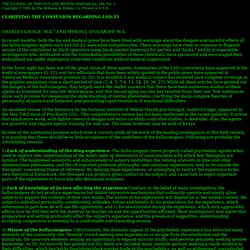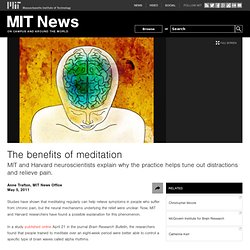

Meditation found to increase brain size. Kris Snibbe/Harvard News Office Sara Lazar (center) talks to research assistant Michael Treadway and technologist Shruthi Chakrapami about the results of experiments showing that meditation can increase brain size.

People who meditate grow bigger brains than those who don’t. Researchers at Harvard, Yale, and the Massachusetts Institute of Technology have found the first evidence that meditation can alter the physical structure of our brains. Brain scans they conducted reveal that experienced meditators boasted increased thickness in parts of the brain that deal with attention and processing sensory input. In one area of gray matter, the thickening turns out to be more pronounced in older than in younger people. “Our data suggest that meditation practice can promote cortical plasticity in adults in areas important for cognitive and emotional processing and well-being,” says Sara Lazar, leader of the study and a psychologist at Harvard Medical School. Controlling random thoughts.
How willpower works - Health & wellness - The Boston Globe - StumbleUpon. The World As I See It - StumbleUpon. "How strange is the lot of us mortals!

Each of us is here for a brief sojourn; for what purpose he knows not, though he sometimes thinks he senses it. But without deeper reflection one knows from daily life that one exists for other people -- first of all for those upon whose smiles and well-being our own happiness is wholly dependent, and then for the many, unknown to us, to whose destinies we are bound by the ties of sympathy. A hundred times every day I remind myself that my inner and outer life are based on the labors of other men, living and dead, and that I must exert myself in order to give in the same measure as I have received and am still receiving... "I have never looked upon ease and happiness as ends in themselves -- this critical basis I call the ideal of a pigsty.
The ideals that have lighted my way, and time after time have given me new courage to face life cheerfully, have been Kindness, Beauty, and Truth. "My political ideal is democracy. The Albert Hofmann Foundations - Clarifying the Confusion Regarding LSD-25. THE JOURNAL OF NERVOUS AND MENTAL DISEASE Vol. 140, No. 3 Copyright © 1965 by The Williams & Wilkins Co.

Printed in U.S.A. In recent months, both the lay and medical press have been filled with warnings about the dangers and harmful effects of the hallucinogenic agents such as LSD-25, mescaline and psilocybin. These warnings have risen in response to flagrant misuse of the substances by illicit operators using black-market materials for parties and "kicks," and by irresponsible investigators who, enthralled with the remarkable possibilities of these chemicals, have sponsored and encouraged their widespread use under improperly controlled conditions without medical supervision. In the furor, sight has been lost of the great value of these agents. Summaries of the LSD controversy have appeared in the medical newspapers (3, 11), and two editorials that have been widely quoted in the public press have appeared in American Medical Association journals (6, 10).
Back to Papers. Benefits of meditation. Studies have shown that meditating regularly can help relieve symptoms in people who suffer from chronic pain, but the neural mechanisms underlying the relief were unclear.

Now, MIT and Harvard researchers have found a possible explanation for this phenomenon. In a study published online April 21 in the journal Brain Research Bulletin, the researchers found that people trained to meditate over an eight-week period were better able to control a specific type of brain waves called alpha rhythms. “These activity patterns are thought to minimize distractions, to diminish the likelihood stimuli will grab your attention,” says Christopher Moore, an MIT neuroscientist and senior author of the paper.
“Our data indicate that meditation training makes you better at focusing, in part by allowing you to better regulate how things that arise will impact you.” A 1966 study showed that a group of Buddhist monks who meditated regularly had elevated alpha rhythms across their brains.